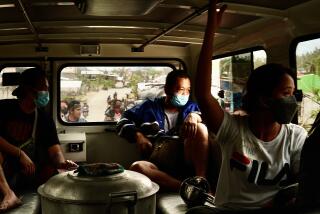Typhoon-stricken Filipinos rely on countrymen abroad for lifeline
- Share via
As millions of Filipinos desperately search for sustenance and shelter in the devastation left by Typhoon Haiyan, many may be comforted by the knowledge that help is surely on the way from family members working abroad.
The Philippines’ biggest export has long been its workers, with at least 10% of the country’s approximately 100 million people living and working in other nations. They staff cruise ships in the Caribbean, clean homes in the affluent Persian Gulf, work as nannies in Europe and crew merchant marine vessels the world over.
For more than 30 years, the Philippines’ legions of jobless and underemployed have been encouraged to seek their fortunes elsewhere, as a succession of leaders since the late Ferdinand Marcos have failed to develop an economy capable of providing enough jobs.
PHOTOS: Typhoon Haiyan slams Philippines
Now, as in the aftermath of other natural disasters, that global workforce is at the forefront of relief efforts and galvanizing the largess of the foreign populations they serve.
About a third of the 10.5 million Filipinos living abroad are in the United States, according to Philippine government figures. That has provided a committed force to raise funds for typhoon victims, over and above the money Filipino emigres and overseas workers send home on a regular basis, said Albert Santoli, a Philippine native who founded the Asia America Initiative. The organization provides development assistance and emergency relief to the Philippines.
“People will send money to their families, since they don’t trust the government,” said Santoli. “Some will send money to the Red Cross, but effectively, they will want to be helping their own families and hometowns.”
Countries with large populations of Filipino workers tend to be more generous because familiarity with the islands’ people has made the crisis more tangible, Filipino expats say.
President Khalifa bin Zayed al Nahyan of the United Arab Emirates, where 680,000 Filipinos work, has donated $10 million to the typhoon relief effort.
“This gesture shows the UAE’s strong support for the Philippines and its people, particularly the overseas Filipino workers here who have contributed to the development of this country,” said Alan Bacason, a Dubai personnel manager whose family lives in Tacloban, one of the areas hit hardest by the typhoon.
Saudi Arabia, with 1.55 million Filipinos -- the expat population after the United States -- pledged $100,000, as has the Arab Gulf Program for Development.
Australia, home to 380,000 Filipino workers, has pledged $10 million in government relief, the national broadcaster ABC reported.
In Malaysia, where 569,000 Filipinos work, established delivery services for money transfers to the Philippines are pitching in on the huge task of getting storm relief to those who need it.
LBC Remittance Express, which is usually busy this time of year shipping Christmas packages to Filipino families back home, is now using its established motorbike and bicycle delivery services to get relief goods from the ports to the devastated inland, where roads are too clogged with storm debris for trucks to pass, dispatcher Emily Yap told Channel NewsAsia.
Even in countries with relatively few Filipino workers, the expats have taken the lead in fund drives. In the Bahamas, for example, where just over 700 Filipinos live and work, more than 200 came together Sunday in an emergency meeting to organize a fundraiser in hopes of helping restore communications with relatives cut off by damage to electric utilities and cellphone towers, Filipino expat community leader Leo Ignacio told the Tribune 24 news channel.
Remittances are a pillar of the Philippine economy. Last year, overseas workers sent home $21 billion, or 13.5% of GDP, the Philippine Central Bank reported. But those figures cover only officially registered transfers, and economists estimate that an additional 30%, at least, is sent home without intermediaries, to avoid fees and taxes.
Filipino overseas workers associations worldwide, such as the Rappler social media site and the H5N1 group of expat medical professionals, are using the Internet and Manila government databases to help Filipinos abroad search for missing relatives, review the official death toll or locate a worthy recipient for donations.
ALSO:Syrian activists mock Geneva II talks online
New Ambassador Caroline Kennedy has built-in following in Japan
Russia outraged by Polish nationalist attack on its Warsaw embassy
A foreign correspondent for 25 years, Carol J. Williams traveled to and reported from more than 80 countries in Europe, Asia, the Middle East and Latin America.
More to Read
Sign up for Essential California
The most important California stories and recommendations in your inbox every morning.
You may occasionally receive promotional content from the Los Angeles Times.











